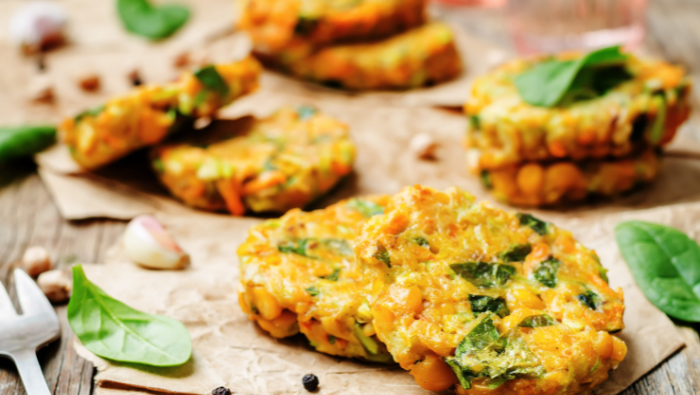
Start your week with achievable workout ideas, health tips and wellbeing advice in your inbox.
You are now subscribed
Your newsletter sign-up was successful
If you’re trying to build muscle, then you need to make sure you’re getting enough protein. This doesn’t mean you have to fill up on meat-heavy meals, though.
These plant-based burgers, featuring a tablespoon of Pea Protein Isolate from MyProtein’s MyVegan range, contain 20g of protein—roughly the same amount as you’ll find in a beef quarter pounder.
This recipe serves four, so you could serve it as a family meal or freeze a few portions for a later date.
Ingredients
- 1 can of chickpeas, drained
- Zest of x1 lemon, juice of ½
- 1 tsp ground cumin
- 1 tbsp Pea Protein Isolate (unflavoured)
- A bunch of cilantro, chopped
- ½ cup breadcrumbs
- 1 medium red onion, ½ diced, ½ sliced
- 1 tbsp olive oil
- 4 buns of your choosing
- 1 large tomato, sliced
- ½ cucumber sliced
- Chili sauce and vegan mayo to serve
Method
- Using a food processor or blender, whizz together the chickpeas, lemon zest and juice, cumin, half the coriander, Pea Protein Isolate and seasoning of your choice.
- Once blended, tip into a bowl and combine with ¾ of the breadcrumbs and diced onions until the consistency becomes firmer and dough-like.
- Shape four burgers and pat the remaining ¼ of the breadcrumbs on either side of the burger and place into the fridge to chill for 10-30 minutes.
- Heat the oil in a frying pan until hot. Fry the burgers for four minutes either side on a medium heat.
- Once cooked, slice each bun and fill with a slice of tomato, red onion, cucumber, coriander and your sauce of choice, before adding the pea burger.
Nutritional info
Per serving, the burgers (including the buns) have 344 calories, 8g of fat, 20g of protein and 56g of carbs. They are also quite high in fiber, with 6g per burger. You can see the full recipe on the MyVegan blog.
Benefits and downfalls of a plant-based diet
Plant-based diets sometimes get a bad rep, because most vegan sources of protein are “incomplete”. This means that they lack one of the nine essential amino acids (EAAs) that our body requires to function.
“All proteins are comprised of amino acids, nine of which are essential—meaning they must be obtained from the diet [and can’t be manufactured by the body],” says registered dietitian Farah Z Khan.
Pea protein is technically a complete protein, but it’s very low in an amino acid called methionine. This means you’ll need to consume other protein-packed plant-based foods, like brazil nuts, to make sure you’re eating adequate amounts.
Start your week with achievable workout ideas, health tips and wellbeing advice in your inbox.
However, there are some big benefits to a plant-based diet, too. A 2021 review in the Nutrients journal suggested that a plant-based diet could reduce the risk of developing metabolic syndrome, which is a combination of diabetes, obesity, and high blood pressure.
Plant-based protein powders vs whey protein powder
A 2021 clinical trial in Sports Medicine pitted plant-based protein powder and whey protein powder against one another, putting two groups of men through a 12-week resistance training program while they took their respective protein supplements and followed a vegan or omnivorous diet.
The research concluded that there were no notable differences between the two groups and that regardless of the source, the men’s high protein intake supported muscle growth and increased strength.
For more hints and tips on how to switch to a vegan diet, read through our round-up of the best sources of vegan protein.

Lou Mudge is a Health Writer at Future Plc, working across Fit&Well and Coach. She previously worked for Live Science, and regularly writes for Space.com and Pet's Radar. Based in Bath, UK, she has a passion for food, nutrition and health and is eager to demystify diet culture in order to make health and fitness accessible to everybody.
Multiple diagnoses in her early twenties sparked an interest in the gut-brain axis and the impact that diet and exercise can have on both physical and mental health. She was put on the FODMAP elimination diet during this time and learned to adapt recipes to fit these parameters, while retaining core flavors and textures, and now enjoys cooking for gut health.
